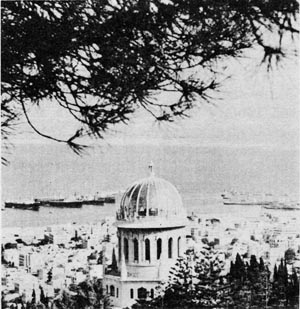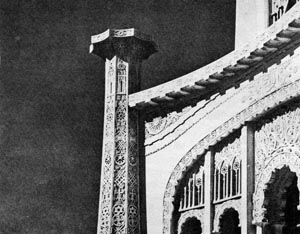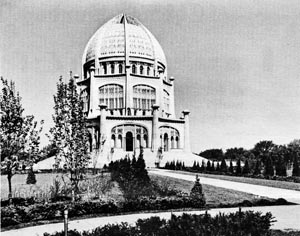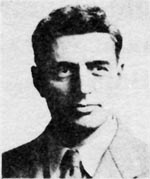
|
|
Abstract: "An Exotic Faith Has Built One of the World's Great Temples Here. A Believer Tells What That Faith Means to Him." Notes: This newspaper article was republished as a brochure by the Bahá'í Publishing Trust (Wilmette, 1958), with permission of Chicago Sunday Tribune. |
I am a Bahá'í
by Guy Murchie
pages 1-4, out of 4 total pagesChicago, Illinois: Chicago Sunday Tribune, 1958-07-13
An Exotic Faith Has Built One of the World's Great Temples Here. A Believer Tells What That Faith Means to Him.
I AM A BAHA'I. This means I believe in the new world faith that began in Persia a hundred years ago and is just now coming to general attention in the west.

It sounds so strange and oriental to most people who were brought up either as Protestants, Catholics, Jews, or without any formal religion, that I am continually being asked, "How did you happen to get mixed up in that Bahá'í faith?" or "Where did you ever discover such a queer religion?" To which I usually reply: "I was paid to investigate it and found it so good I made it my own."
This is literally true, for when it happened some 17 years ago I was a writer for The Chicago Tribune. Col. Robert R. McCormick, who had seen an exotic nine-sided temple being built on the shore of Lake Michigan in Wilmette, asked me to find out what it was all about.
I did so and found the temple absolutely unique of architecture, a blend of east and west that also expressed classic feeling in modern form. I found nothing but beauty in the lacy texture of its great dome, its nine white quartz doorways inscribed with Bahá'í quotations such as "The best beloved of all things in My sight is justice," or "I have made death a messenger of joy to thee; wherefore dost thou grieve?"
The spiritual creed behind this extraordinary creation struck me as so reasonable and beautiful that, after a few months of studying its history and principles and finding it stood for world unity and love and progress, and that it did not conflict with Christianity (but rather fulfilled it) nor modern science, nor anything else I believed in, I embraced it in its entirety. Altho I was brought up as an Episcopalian and my grandfather had been successor of the famous Phillips Brooks as rector of Trinity church in Boston, I did not think that one's religion should be decided solely by the "accident" of birth.
I had long since read the Koran and the Torah and had studied Buddhism in China, coming to the general conclusion that an oriental really has just as much ground for accepting Buddha as an occidental has for feeling partial to Christ-that the true meaning of the "many mansions of the Lord" is that spiritual truth comes to this world in many forms, while divine revelation (if you consent to calling it that) is not a once-and-for-all phenomenon but rather a progressive development that will continue indefinitely.
In other words, it seemed apparent that just as scientific truth has been revealed by a succession of teachers from Pythagoras to Copernicus to Galileo to Kepler to Newton to Einstein, so has spiritual revelation come in turn from such prophets as Krishna, Moses, Zoroaster, Buddha, Christ, Mohammed, and now the Bahá'í prophets, the Bab and Bahá'u'lláh.
And will not both successions continue in future as has been clearly explained not only by Einstein for the scientists but by all the great religious teachers?
Christ Himself said at His Last Supper (John 16:12) : "I have yet many things to say unto you, but ye cannot bear them now. Howbeit when He, the Spirit of Truth, is come, He will guide you unto all truth."
Bahá'ís believe that Bahá'u'lláh, whose title means "The Glory of God," literally fulfilled that prophecy of Christ in the 19th century. Certainly He boldly claimed as much, declaring Himself none other than the very Spirit of Truth referred to at the Last Supper. And His life was His great testament to the fact, most of it spent under severe persecution and imprisonment by the fanatical Moslem rulers of Persia and Turkey, during which He managed to write some 200 profound books and tablets.
The essence of His teachings, all so universal in scope, was summarized in a number of basic principles by His son, Abdu'l-Bahá, when He spoke before western audiences. These seemed beyond any practical possibility of realization, yet have ever since, in their various ways, come nearer and nearer to the grasp of people everywhere:

Exquisite detail from the Bahá'í temple at Wilmette, Ill. |
1. The oneness of mankind.
2. The common foundation of all religions.
3. The independent investigation of truth.
4. Religion and science as integral parts of one truth.
5. Equality of men and women.
6. Elimination of prejudice of all kinds.
7. Universal compulsory education.
8. Spiritual solution of the economic problem.
9. A universal language.
10. Universal peace guaranteed by a world government.
The beginning of this unique, modern revelation was felt first early in the last century in Persia, where a few devout members of the Shaykhis, a Moslem sect, believed that Mohammed's announcement in the Koran of a prophet succeeding him would actually come to pass in the year 1844.
Then, on May 22, 1844, a young merchant of Shiraz quietly revealed that he was the promised one foretold by Mohammed.

Beautiful temple located on the shores of Lake Michigan at Wilmette, Ill |
Startling as was this bold claim to the Moslem world, even more astonishing was the declarant's message that a much greater prophet would appear shortly after him whose teachings would not only fulfill the prophecies of Islam but of all religions and would within a very few generations drastically change the whole world of mankind.
The young merchant took the symbolic title of the Bab, meaning "The Gate," and showed such vision and beauty of character that he soon had 18 devoted disciples known as "The Letters of the Living."
The governor of Shiraz feared his influence so much he sent a company of soldiers on horseback to capture him and bring him back in chains. The story of this expedition is revealing. Advancing cautiously along a country road, the captain of the troop met a smiling young man wearing a green sash, riding on horseback. When the gay horseman greeted him and offered to help him find his destination in this unfamiliar area, the captain, afraid to trust a stranger, replied, "No, thank you, sir. We're on a special mission by order of the governor."
"But I can save you time and trouble," said the young man, "for it is I the governor sent you to arrest."
This rare exhibition of clairvoyance, selflessness, and friendly cooperation completely amazed the soldier, who had expected the Bab to try to run away. As he talked with him, he became so overwhelmed with the radiant warmth and quality of his intended prisoner that he got down and kissed the Bab's stirrup, at the same time begging him to escape from the province and go beyond reach of the governor's authority.
The Bab refused to run away. Assuring the captain that God would reward his kindness, he insisted on going to the governor with the soldiers, explaining to them that he himself had nothing to fear, as God was always with him. "No man can harm me until my work on earth is done," he said gently. "And then I will be happy to die for God, Whom I love."
The magistrates and high mullas did not all respond in the same way to the Bab's spiritual qualities, and during the next four or five years he was subjected to a relentless series of imprisonments, inquisitions, scourgings, and indignities culminating, as he had foreseen, in his death sentence in 1850. This was executed by a regiment of 750 Armenian soldiers who publicly shot him on July 9 in the old barrack square of Tabriz, together with a devoted youth who had begged for the honor of sharing his martyrdom.
The first volley of bullets missed both men completely while severing their ropes to set them free. A second regiment was called because the first refused to fire again after the "miracle." Immediately after the shooting, a black whirlwind swept thru the city.
Heroic Woman Is Early Bahá'í Disciple
Only one of the Bab's disciples (or Letters of the Living) was a woman. Known for her beauty as a girl, she was later named Tahirih, "the Pure One," by Bahá'u'lláh. So brilliant was her mind that it was said her father and brothers were often embarrassed to discuss anything important in her presence for fear they might expose their inferiority.
It was inevitable that such a woman would be condemned by the orthodox Moslem authorities. Tahirih herself foresaw her own maryrdom so precisely that she fasted in-- praise of God all the preceding day and dressed in a bridal gown of snow white silken cloth in time for the unannounced arrival of the executioner's men.
At night she was taken on horseback to a remote garden and brutally strangled with a large silken kerchief she herself had brought for the purpose. Nothing was too ruthless in the attempt that was then made to exterminate completely the Babis and to stamp out the light of their faith. Still the light burned and faith continued.
In 1863, Bahá'u'lláh made His great announcement. The world stirring message of his new revelation was publicly released. By then He too had suffered imprisonment as a Babi, was tortured, and nearly starved while in chains in a putrid dungeon for four months.
Meanwhile, a fanatical mob ransacked His beautiful home in Mazindaran, and His suddenly impoverished family were left to hide with friends. Tormented with worry, they tried to think of a way to save His life. The extreme persecution made a particularly dramatic contrast, because Bahá'u'lláh's father had been a respected minister of state and His family one of high nobility and wealth, even tho He had given away a large part of it to the poor.
Tho Bahá'u'lláh nearly perished in the dungeon and was one of the few survivors of that horrifying experience, thruout the ordeal, He tried to spare His family as much anguish as possible. His daughter, remembering His deliverance from the black pit a half century later, said:
"We who saw the marks of what He had endured, where the chains had cut into the delicate skin, especially that of His neck, His wounded feet so long untended, evidence of the torture of the bastinado, how we wept with my dear mother . . . He, on his part, told only of the steadfast faith of the friends (fellow prisoners) who had gone forth to meet their death at the hands of their torturers with joy and gladness . . ."
The glorious spiritual victory was so overwhelming that He hardly seemed to recall the shame and pain and scorn at all!
This exaltation may have been due also to the divine vision Bahá'u'lláh had while in the dungeon, for, paradoxically. it was in this very manmade hell that the first full realization came to Him that He, Himself, was to be the promised one referred to by the Bab.
"We saw a new radiance seeming to enfold Him like a shining vesture," said His daughter, "tho we had no idea yet as to its significance."
In fact, 10 years were to pass before the time was ripe for His declaration of Prophethood, during which He and His family were exiled from Persia and ordered to live in Baghdad. This journey was made by muleback in winter under conditions of great hardship while His wife was about to have her fourth child and Bahá'u'lláh was still seriously ill from the horrors of the dungeon.
For one period of two years, following the exile to Baghdad, Bahá'u'lláh lived apart in a mountainous wilderness in the guise of a dervish, subsisting on what little coarse bread and goat cheese He could find, living in caves, praying on the windy slopes, fasting often, ministering to the few simple folk who chanced His way - until His body and soul were tempered to the keenest pitch of purity and He felt the call to return for His major creative ministry to the world.
As His reputation and influence now grew more rapidly than ever, with Jews, Christians, and Zoroastrians as well as Moslems flocking to Baghdad to hear His teachings, the orthodox mullas of Islam, fearing anew the doom of their authority, prevailed upon the Turkish government to banish Bahá'u'lláh still farther -first to Constantinople, then to Adrianople.
Finally, He was sent to the pestilential Turkish prison city of Akka in Palestine, where, they imagined, his influence must inevitably be lost thru forced isolation from the world and association only with the most sordid and hardened of criminals.
Little did they realize that they were actually causing Him literally to fulfill many biblical prophecies as well as the scriptural prophecies of other world religions that would later help to confirm their followers in His faith.
Bahá'u'lláh was serene through it all. Once a relative, jealous of the power that radiated from Him and the love of His devoted followers, poisoned Him, almost fatally. Locked up in makeshift quarters, He wrote almost daily either with His own hand at a crude table in a tiny room under guard, where sometimes rats competed with the children for meagre crusts of bread, or more often pacing back and forth dictating far into the night to one of His devoted followers who penned His words by candlelight.
Many pilgrims still sought His presence, even at great risk. More than 70 actually contrived to have themselves convicted as His followers so they could share imprisonment with Him in Akka, while others disguised themselves as merchants in some nearby town in order to be close to Him.
In 1869 Bahá'u'lláh composed His famous second Tablet to Napoleon III, rebuking him for his contemptuous attitude and for imagining he could gain anything by another war: "...Thy doings shall throw thy kingdom into confusion, sovereignty shall pass from thy hands . . . Hath thy pomp made thee vain-glorious? It shall not endure. Nay, it shall pass away unless thou dolt cling unto this strong cord. We behold abasement hastening upon thy heels and thou art yet of them that are heedless . . ."
Napoleon, then at the zenith of his power, paid no heed to this "crank note" and truculently launched the Franco-Prussian war the following year. But instead of the easy triumph he expected, he was decisively overwhelmed, taken prisoner, and dragged in disgrace to Prussia. Two years later he ignominiously came to his end in England.
Similarly significant and prophetic were the tablets Bahá'u'lláh wrote from time to time to other heads of state, including the Sultan of Turkey (whose prisoner He was), the Shah of Persia, Queen Victoria, and Kaiser Wilhelm If of Germany to whom he plainly pointed out the lesson of Napoleon, warning of the inevitable outcome of World War 1, a quarter of a century later!
The only westerner to interview this extraordinary prisoner was the distinguished orientalist, Prof. Edward G. Browne of Cambridge university, who saw him in Akka in 1890 when He was 73 years old. "The face of Him on whom I gazed t can never forget, tho I cannot describe it," wrote Browne afterward. "Those piercing eyes seemed to read one's very soul; power and authority sat on that ample brow, while the deep lines on the forehead and face implied an age which the jet black hair and beard flowing down to indistinguishable luxuriance almost to the waist seemed to belie.
"No need to ask in whose presence I stood as I bowed myself before one who is the object of a devotion and love which kings might envy and emperors sigh for in vain!" Abdu'l-Bahá, whom His father, Bahá'u'lláh had long recognized as having great spiritual insight, was appointed by Him to serve as exemplar of His Teachings after His death. Thus the Bahá'í cause continued into the 20th century to have a powerful guiding leadership in the person of one qualified and entrusted to live as a perfect example to the world.
It may seem too much to an unprepared outsider to accept thus three divinely inspired leaders of one faith, but to an independent, unbiased mind could there not also be abundant evidence here of the spiritual source in their unique and perfect unity?
Altho the Bab never once saw Bahá'u'lláh in body, he prepared the world for Him with supreme devotion, recognizing and identifying Him beyond any question as the one to usher in a new age. Abdu'l-Bahá, in turn, never claiming the rank of prophethood, lived a life that was almost universally accepted as Christlike.
Since the death of Abdu'l-Bahá in 1921, the Bahá'í Faith has continued to grow. Under the guidance of their late leader, Shoghi Effendi, grandson of Abdu'I-Baha, Local and National Assemblies are building their unified organization in more than 250 countries, territories, and dependencies.
The believers in this faith have included many celebrated persons, including Queen Marie of Rumania. Woodrow Wilson's daughter was an ardent student of the Bahá'í teachings; it is said that she was instrumental in influencing her father to include the Bahá'í principles in his "Fourteen Points" at Versailles.
Concerning the Bahá'í teachings Tolstoy has written that it presented "the highest and purest form of religious teaching." A man of science, Luther Burbank stated: "The religion of peace is the religion we need . . . and in this Bahá'í is more truly the religion of peace than any other.”
Without any professional clergy or priesthood, without ritual or passing the collection plate in their simple informal meetings, the Bahá'ís everywhere are making themselves the ripples of a flowing tide that is rising steadily and inexorably, directed from their World Center in Haifa, Israel. They believe the light of God shines on their great and growing work which is nothing less than to give a lasting peace to the whole Earth.

I AM A BAHÁ'ÍReprinted by permission of Chicago Sunday Tribune
MAGAZINE SECTION
BAHA'Í PUBLISHING TRUST
415 Linden Avenue, Wilmette, Illinois
Printed in U.S.A.
Guy Murchie is a former staff writer for this magazine and author of "Music of the Spheres" and other books. He is now [1958. -ed] living in Malaga, Spain, where he is working on a new book.
|
|